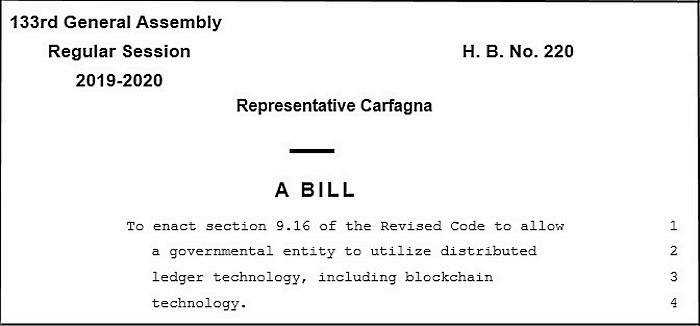Pro-Bitcoin Ohio Bill Promotes Government Adoption of Blockchain

The state of Ohio is embracing blockchain tech. | Source: Shutterstock
By CCN.com: A bill introduced this week in the Ohio House of Representatives urges government entities to adopt blockchain, the technology underpinning bitcoin. Republican state representative Rick Carfagna sponsored the bill.
The legislation, called House Bill 220, is part of Ohio’s plan to provide a legal framework for distributed ledger technology such as blockchain (see text below). Rep. Carfagna did not return CCN.com’s calls for comment.
The legislation would enable the establishment of a decentralized online record for transactions such as car titles or hunting licenses, according to Cleveland.com .
Ohio has been making strides to become more crypto-friendly as part of a major effort to woo tech entrepreneurs to transform the state into a blockchain hub.
Ohio wants to woo tech entrepreneurs
In August 2018, Governor John Kasich signed a bill that recognized the use of blockchain-based transactions as having legal bearing in a court of law. The bill made Ohio one of the first U.S. states to provide legal protection to companies developing new uses for blockchain.
In November, Ohio became the first US state to allow businesses to pay taxes using bitcoin. The state government partnered with crypto payment processor BitPay to manage the payments in crypto and conversion to dollars.
The idea was the brainchild of Ohio’s Republican state treasurer, Josh Mandel, a cryptocurrency fan who says bitcoin is “a legitimate form of currency.”
Ohio Rep. wants to exempt crypto from federal securities laws
Then, in April 2019, Ohio’s Republican Congressman Warren Davidson — an avowed bitcoin fan — introduced federal legislation that would exempt cryptocurrencies and ICOs from US securities laws.
As CCN.com reported, the Token Taxonomy Act would amend the Securities Exchange Act to specifically exclude cryptocurrencies from securities laws.
In a December 2018 statement , Rep. Warren Davidson underscored the importance of avoiding overly restrictive laws that would stifle innovation in the nascent crypto industry.
“In the early days of the Internet, Congress passed legislation that provided certainty and resisted the temptation to over-regulate the market. Our intent is to achieve a similar win for America’s economy and for American leadership in this innovative space.”
“Virtual currencies and the underlying blockchain technology has a profound potential to be a driver of economic growth. That’s why we must ensure that the United States is at the forefront.”
Davidson reaffirmed the sentiments he had expressed in June 2018, when he underscored the importance of not strangling the budding digital currency ecosystem with draconian legislation that would choke off innovation.
“We need a light-touch regulatory framework,” Davidson told CNBC (see video).
